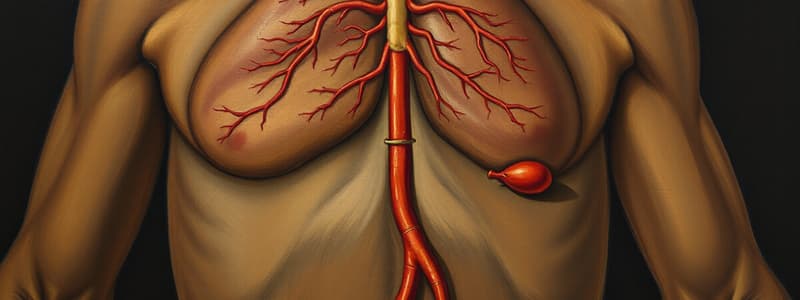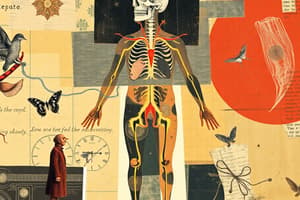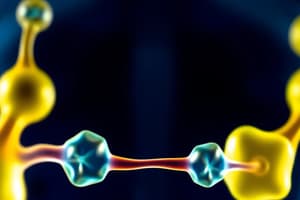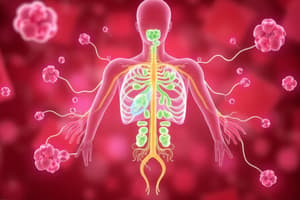Podcast
Questions and Answers
What is the primary function of the endocrine system?
What is the primary function of the endocrine system?
- Producing mechanical movements
- Regulating electrical impulses
- Influencing metabolic activity through hormones (correct)
- Facilitating digestive processes
Which of the following glands is NOT considered an endocrine gland?
Which of the following glands is NOT considered an endocrine gland?
- Adrenal gland
- Thyroid gland
- Pituitary gland
- Sweat gland (correct)
How do endocrine responses generally compare to nervous system responses?
How do endocrine responses generally compare to nervous system responses?
- Immediate and temporary
- Equally rapid and permanent
- Faster but shorter-lasting
- Slower but longer-lasting (correct)
Which organ serves both exocrine and endocrine functions?
Which organ serves both exocrine and endocrine functions?
What type of substances do exocrine glands produce?
What type of substances do exocrine glands produce?
Which gland is considered a neuroendocrine gland?
Which gland is considered a neuroendocrine gland?
What are the gonads in the human body responsible for?
What are the gonads in the human body responsible for?
Which of the following is NOT a function of the endocrine system?
Which of the following is NOT a function of the endocrine system?
What are the two main classes of hormones in the endocrine system?
What are the two main classes of hormones in the endocrine system?
What defines autocrine signaling?
What defines autocrine signaling?
Which type of hormone does NOT typically act on receptors in the plasma membrane of target cells?
Which type of hormone does NOT typically act on receptors in the plasma membrane of target cells?
What role do target cells play in hormone action?
What role do target cells play in hormone action?
How can hormones alter the activity of target cells?
How can hormones alter the activity of target cells?
Which type of hormone is synthesized from cholesterol?
Which type of hormone is synthesized from cholesterol?
Which of the following statements correctly describes paracrines?
Which of the following statements correctly describes paracrines?
What is one effect hormones can have on target cells?
What is one effect hormones can have on target cells?
Flashcards are hidden until you start studying
Study Notes
Overview of the Endocrine System
- The endocrine system integrates and coordinates body functions with the nervous system.
- Hormones transported in blood influence metabolic activity, leading to slower but longer-lasting responses compared to the nervous system.
Functions of the Endocrine System
- Controls reproduction and growth.
- Maintains electrolyte, water, and nutrient balance.
- Regulates cellular metabolism and energy levels.
- Mobilizes body defenses against stress and disease.
Types of Glands
- Exocrine Glands:
- Produce non-hormonal substances (e.g., sweat, saliva).
- Have ducts to carry secretions to membrane surfaces.
- Endocrine Glands:
- Produce hormones without ducts.
- Major glands include:
- Pituitary gland (brain)
- Thyroid and parathyroid glands (cervical region)
- Adrenal glands (above kidneys)
- Pineal gland (brain)
- The hypothalamus functions as a neuroendocrine gland.
Organs with Both Exocrine and Endocrine Functions
- Pancreas: Secretes insulin (endocrine) and digestive enzymes (exocrine).
- Gonads: Testes (males) and ovaries (females) produce hormones and gametes.
- Placenta: Functions as both endocrine and exocrine during pregnancy.
- Other hormone-producing tissues: adipose tissue, thymus, stomach, kidneys, heart.
Chemical Messengers
- Hormones: Long-distance signals via blood or lymph.
- Autocrines: Chemicals acting on the same cell that secreted them.
- Paracrines: Local chemicals affecting nearby cells; not part of the endocrine system.
Classes of Hormones
- Amino Acid-Based Hormones:
- Include amino acid derivatives, peptides, and proteins.
- Steroid Hormones:
- Synthesized from cholesterol; includes gonadal and adrenal hormones.
- Eicosanoids: Considered paracrines, not classified as traditional hormones.
Mechanism of Hormone Action
- Only target cells with specific receptors are affected by hormones.
- Action methods include:
- Stimulating synthesis of enzymes/proteins.
- Altering plasma membrane permeability and potential.
- Activating/deactivating enzymes.
- Inducing secretory activities.
- Signaling mitosis.
Hormone Interaction with Target Cells
- Hormones categorized based on solubility affect their action:
- Water-Soluble Hormones: Bind to receptors on plasma membranes; commonly activate G protein-coupled second messengers.
- Lipid-Soluble Hormones: Typically pass through membranes and bind to intracellular receptors; they alter gene expression directly.
Studying That Suits You
Use AI to generate personalized quizzes and flashcards to suit your learning preferences.




